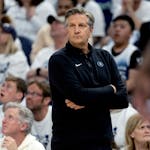Royce White scored 30 points and had 19 rebounds Tuesday night to lead the London Knights of the Canadian National Basketball League to the Central Division Finals.
The former Minnesota prep star and Gophers recruit has dominated the Canadian league all season. White is among the top four scorers, top two rebounders, has a top five field-goal percentage and is one of the league's assist leaders.
While these numbers and success in the postseason are nice, White is back in national headlines this month after being touted "The most important basketball player alive" by Esquire magazine.
What about LeBron James or Stephen Curry?
The Esquire article really has nothing to do with comparing White to other basketball talent, but instead explores how his anxiety disorder derailed a promising NBA career and highlights his new goal to transform how sports and culture think about mental health.
White, 26, drafted No. 16 overall in the 2012 NBA draft out of Iowa State, said his fight to bring awareness and raise support for mental health has cost him tens of millions in wages. He told Esquire he has turned down numerous offers to play in the NBA, but White will not play another game in the league until he sees a more comprehensive plan to address mental health treatment.
The article also addresses White's three-year hiatus from basketball, his family history, childhood heroes, off-the-court pursuits, how anxiety affects family life, and run-ins with the law that eventually led to his departure from the University of Minnesota.
White also noted he was diagnosed with generalized anxiety disorder while in high school and began to see a therapist. His high school and college coaches were accommodating, but that changed when he reached the NBA.
White said he considers his battle with the NBA a civil-rights fight.
Here are some highlights from the article:
**White isn't sure whether his efforts will ever land him back in the NBA, but he says the fight is bigger. For now, his battleground for his playing career and his cause is this rust belt, snow-covered town of 380,000 in Canada. It is here where he continues to fire off social media missives about mental health, lobby the NBA, and hit the weight room in order to get back into shape after so many years away. Now he and those around him are wondering: Will it work?
**The National Football League offers a hotline for players and families, but does not address mental health specifically in its legally-binding, collective bargaining agreement. Nor do Major League Baseball or the National Hockey League specify mental-health protocols in their agreements with player unions—even after the NHL's behavioral-health program was the subject of a lawsuit by the family of Derek Boogaard [former Wild forward], an enforcer with the New York Rangers who committed suicide [in Minnesota] in 2011 at age twenty-eight.
**The NBA is "in the process right now" of adding more mental-health protocols to the new collective bargaining agreement. ... [Kathy Behrens, the league's president of social responsibility and player programs] declined to comment on the specifics of White's case, but said his outspokenness about mental-health issues represented a step in the right direction. "I give Royce a lot of credit for being open about his situation," she said. "I think one of the things we've learned the most and focused on is helping players understand that it's okay to ask for help and take advantage of the resources and systems we have in place." (A representative with the Rockets did not respond to requests for comment.)
**Over time, he says, he has gotten better at dealing with his anxiety, "but I still struggle to find those moments of relief during the day." He takes Xanax or Klonopin as needed, sees a therapist, and makes a point of talking to friends and professionals on the phone or in person, especially when his anxiety reaches a zenith. "They talk me down," he said. "It really, really helps. There are still those moments when you're struggling to find relief during the day."
**For the moment, though, White says he's "a ten" in terms of his happiness in London. The very act of playing the game, whether on a small or large court, represents an affirmative act against his own demons and any societal expectations that used to confine him.
May is mental health awareness month. Here is one take on how baseball can be a trailblazer for all sports to institute better mental health protocol.





